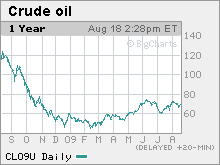Oil slips below $69
Chinese stock markets fall almost 5%, rattling investor confidence in the global recovery efforts. Markets await government supply data.
LONDON (Reuters) -- Oil fell below $69 a barrel on Wednesday after a near 5% slump in Chinese shares sent doubts rippling through global markets about the strength of the world economic recovery.
Prices had surged by more than 3% in the previous session on tentative signs oil demand could be picking up in the United States, the world's largest energy consumer, but with investors' desire to take on more risk again firmly linked to Chinese growth, confidence has been shaken.
U.S. crude for September delivery was down 40 cents at $68.79 a barrel, off an earlier session low of $68.54.
"The good news that has driven markets over much of the summer has been emanating from China, they seemed to be leading the return to global growth," said Paul Harris, head of natural resources risk management at Bank of Ireland Global Markets.
"But this is going to be a patchy recovery as we emerge from such a sharp global slowdown -- it's not going to be in a straight line, even if this equity sell-off doesn't really signal any fundamental changes to the outlook for oil."
Shanghai stocks tumbled to a two-month low and have slumped by around 20% in just two weeks but remain up by more than 50% so far this year.
Oil prices had been supported by data released late on Tuesday from the American Petroleum Institute (API) showing U.S. crude oil stockpiles fell last week by 6.1 million barrels, against forecasts for a 1.3 million barrel build.
U.S. distillate stocks rose by 1.5 million barrels, more than double what analysts had expected, while gasoline stocks fell less than forecast.
The release of the more closely watched U.S. Energy Information Administration (EIA) data later in the day could confirm the American Petroleum Institute's (API) bullish figures, and will determine the market's trading tone for the rest of the week.
"What's keeping the market down is high U.S. inventories, which is a proxy for demand," said Tony Nunan, risk manager at Tokyo-based Mitsubishi Corp.
"If the EIA data confirms the API report, we could see the market head higher. The $76 level will be a top for the market in the medium term until we see further drawdowns in the inventories," he added.
The EIA figures will be released at 10:30 a.m. ET.
Traders also watched for storms in the Atlantic Basin but there was no immediate threat seen to U.S oil installations in the Gulf of Mexico.
Hurricane Bill, the first of the 2009 Atlantic season, grew quickly into a major Category 3 storm on Tuesday and could strengthen as it curves north, likely missing the eastern United States as it passes Bermuda.
Kuwait sees no need for OPEC to change oil supply targets at its meeting in September as the oil price is satisfactory, the country's oil minister said on Wednesday.
The Organization of the Petroleum Exporting Countries, supplier of over a third of the world's oil, meets on Sept. 9 in Vienna to discuss supply policy.
Oil prices have more than doubled so far in 2009, boosted in part by OPEC's decision to cut supplies to the market. ![]()



